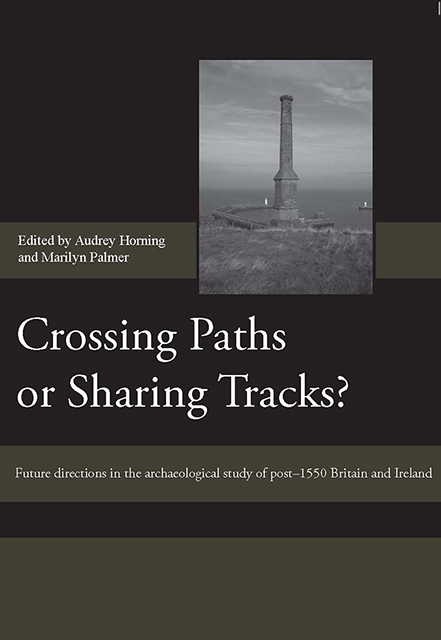 Crossing Paths or Sharing Tracks?
Crossing Paths or Sharing Tracks? Published online by Cambridge University Press: 07 March 2023
Many aspects of Ireland's landscapes and material culture, dating from the early modern period up to Independence and partition in 1922, continue to be viewed as symbols of a ‘colonial’ past. However, to an overwhelming majority of specialists working directly with the primary source material for Irish history and archaeology the notion, as proposed by nationalist historians and postcolonialists, that the essential relationship between Ireland and the United Kingdom was that of ‘colony’ and ‘metropolitan state’, bothmisrepresents and oversimplifies the nature of that association. By dividing the native and settler populations into colonists and colonised, postcolonial discourse theory, as applied to Ireland, off ers a one-dimensional, reductivist view of the experience of immigrant and native populations. Not all colonists were the same, while English rule was experienced in many diff erent ways by settlers and natives alike. Recent work on the archaeology of the former Royal Naval base at Haulbowline, built in 1816–22 to supply the entire British South Atlantic fleet, enables and off ers a contrasting view to the traditional, essentially nationalist, interpretation of Ireland's many-sided subjugation to Britain's interest as ‘colonial’. It is argued here that Haulbowline was in every way part of a colonial project, but one in which Irish people were very much junior partners rather than victims. Indeed, the very presence of such an installation in Ireland, as in the case of a post office or courthouse, should really be viewed as evidence that the island was a fully functioning part of the United Kingdom rather than a British colony.
INTRODUCTION: POSTCOLONIALITY AND IRELAND
For an overwhelming, almost total, majority of Irish historians and archaeologists, the notion that the essential relationship between Ireland and the United Kingdom was that of ‘colony’ and ‘metropolitan state’ bears no relation to the evidence they encounter on a daily basis. Yet postcolonial studies in Ireland has never really been much concerned withthe ‘evidence’. Of course, no one really expects the literary critics who make up their ranks to be or to become historians. Like everybody else, they are entitled to question modern historiographical methodologies or revisionist views of Irish history, but only so far. Indeed, in their opposition to the views of ‘revisionist’ historians of Ireland, they have as yet failed to produce a convincing defence of the essentially nationalist idea that Ireland was, up to independence in 1922, simply a British colony.
To save this book to your Kindle, first ensure [email protected] is added to your Approved Personal Document E-mail List under your Personal Document Settings on the Manage Your Content and Devices page of your Amazon account. Then enter the ‘name’ part of your Kindle email address below. Find out more about saving to your Kindle.
Note you can select to save to either the @free.kindle.com or @kindle.com variations. ‘@free.kindle.com’ emails are free but can only be saved to your device when it is connected to wi-fi. ‘@kindle.com’ emails can be delivered even when you are not connected to wi-fi, but note that service fees apply.
Find out more about the Kindle Personal Document Service.
To save content items to your account, please confirm that you agree to abide by our usage policies. If this is the first time you use this feature, you will be asked to authorise Cambridge Core to connect with your account. Find out more about saving content to Dropbox.
To save content items to your account, please confirm that you agree to abide by our usage policies. If this is the first time you use this feature, you will be asked to authorise Cambridge Core to connect with your account. Find out more about saving content to Google Drive.